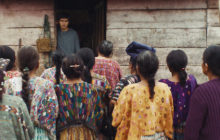Latinoamerican Boom at ZFF
15. October
Four exciting titles on this year’s program come from Latin America. They are characterized by uncompromising style, fresh directorial approach and interesting stories in which authors deal with the past, but also the future of their home countries. Two festival and marginally experimental hits of neon tones and great soundtracks, Divine Love by Gabriel Mascaro and Ema by Pablo Larrain come from Brazil and Chile, and two potential Oscar winners, Monos by Alejandro Landes and Our Mothers by César Díaz face the war heritage of Columbia and Guatemala in an interesting way.
The Together Again program will feature Divine Love, the third film by Gabriel Mascaro, director of the Neon Bull, a sensual look behind the scenes of the Brasilian rodeo, shown at the 14th ZFF. In Divine Love, a dystopia taking place in the near future, Mascaro presents a world akin to Atwood’s Handmaid’s Tale in which Brazil is no longer the world capital of an easy-going lifestyle, football and samba, but drive-in confessions, genetic engineering and hard core Christianity. In this world, Christians participate in afternoon group readings of the neon Bible and evening group sex and parties accompanied with the soundtrack featuring the most interesting Brasilian DJ names. In this witty and sensual SF dominated by neon colors, critics read a protest against the vision of the future of the current president Bolsonaro.
The dance melodrama Ema, also featured in the Together Again program, features a similar neon ambience and fantastic soundtrack (Nicolas Jaar). The author is Pablo Larrain, currently the most prominent name of Chilean cinematography, a director of recognizable aesthetic whose films return to the general places of history and biographies of famous people from completely unexpected perspectives (Tony Manero, Jackie with Natalie Portman, Neruda, which was distributed by ZFF). Ema is Larrain’s seventh film, taking place in the port town of Valparaiso where the heroine Ema (the fantastic Mariana Di Girolamo) and Gaston (Gael Garcia Bernal), a married couple of reggaeton dances who recently started living apart. They blame each other for giving up on their adoptive son who was returned to the orphanage because of his pyromania and violent tendencies. Ema is Larrains’ most experimental and interesting film to date, and critics also praise it for its portrait of the heroine who is at the same time wild, brave and a misfit, but does not conform to existing stereotypes.
Having just won the Best Film award at the BFI London Film Festival and the special award at the Sundance festival, the Columbian Oscar candidate arrives to the main program of ZFF, Monos, by Alejandro Landes. A tense mix of war film and thriller, Monos offers a disturbing and hallucinatory vision of the chaos of war ruled by children, which is why critics have compared it to Apocalypse Now and Lord of the Flies. On a mountaintop, eight teenager guerilla warriors with rifles watch an American hostage, Doctora, and a cow, Shakira. They perform military drills by day, and indulge in youth hedonism by night. Aside from being considered a masterpiece of independent film, Monos was a success on the Columbian box office – people rushed to see a film dealing with the problem of rooted war and violence. The director loosely based the story on his own family trauma and hired an ex-member of FARC’s special unit, Wilson Salazar, as a script advisor, who was also later cast for one of the major roles in the film. The film is praised for stunning visuals which are the product of the director of photography, Jasper Wolf, as well as the fact it was filmed at 4300 meters above sea level in the rain, fog and cold. Music is composed by Mica Levi, also known as Micachu (Under the Skin, Jackie).
Another film from ZFF’s main program, the current Belgian Oscar candidate, co produced by Belgium, France and Guatemala, Our Mothers by César Díaz, also deals with a similar topic – the consequences of the long-lasting civil war in Guatemala which resulted with the ethnic cleansing of the indigenous people. The year is 2018. The whole country is preoccupied with the trial of ex-commanders in the civil war, while the victims’ testimonies pour in from all sides. Ernesto (Armando Espitia – Heli, 2013) is a young forensic anthropologist whose job is to identify the bodies of those killed. One day, in a story of an old witness, he detects a clue which could help lead him to his father, a guerilla fighter who disappeared in the war. The film premiered at the Critics’ Week in Cannes, where it won the Caméra d’Or for best first feature film and SACD Award for best screenplay.















